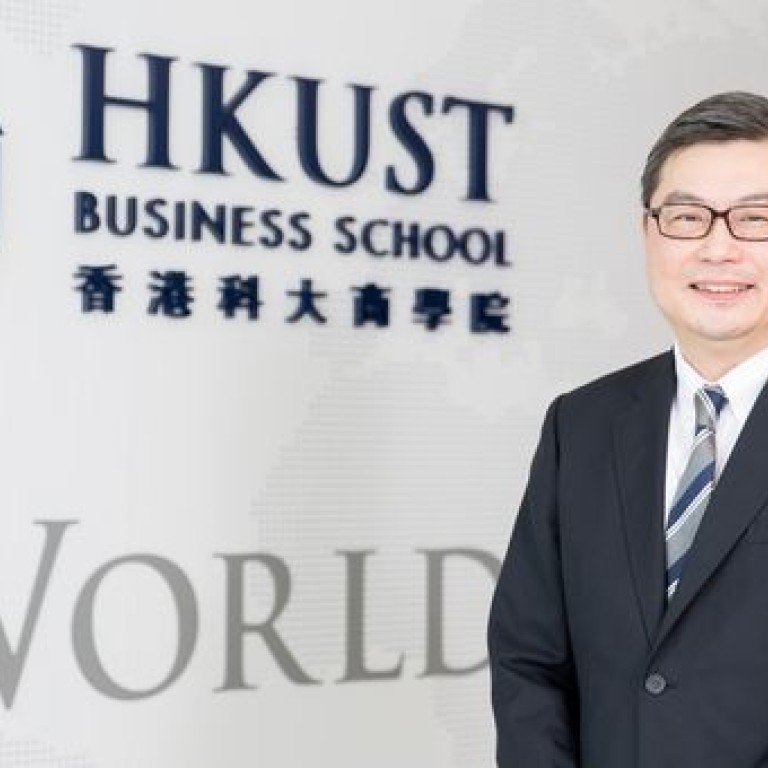
New HKUST dean looks to expand entrepreneurship and innovation
After over 20 years as a respected faculty member at the Hong Kong University of Science and Technology (HKUST), Tam Kar-yan certainly knows his way around. But his recent elevation to dean of the School of Business and Management presents a considerable number of new tests and challenges, he says.
After over 20 years as a respected faculty member at the Hong Kong University of Science and Technology (HKUST), Tam Kar-yan certainly knows his way around. But his recent elevation to dean of the School of Business and Management presents a considerable number of new tests and challenges, he says.
Some relate to maintaining the school’s high international standing, and continuing to enhance the quality of its courses. Others are more administrative in nature. All, though, require an in-depth understanding of how business is changing, and the foresight to appreciate what students, teachers, and employers will be looking for in the years to come.
“Since joining HKUST in 1992, I have seen the establishment of a business school from the ground up,” says Tam, who previously completed a PhD in the US, and served as a professor at the University of Texas at Austin. “It’s been a valuable and exciting experience. Taking up the new job is like ‘coming home’ after 10 years as associate provost of the university, it brings both opportunities and challenges.”
The former, he notes, arises from being able to leverage assets such as a worldwide reputation, great faculty members, some very supportive colleagues, and a network of more than 20,000 alumni who work in the business community.
The latter derives from the intense competition that comes from other highly regarded schools, locally and within the region. So it’s important to keep attracting the best faculty members, while providing an innovative curriculum for students.
“Over the next three to five years, I want to build on our existing strengths to make the school even more international at the undergraduate level,” says Tam, who is a chair professor of information systems, business statistics and operations management. “Our MBA and EMBA programmes are already very diversified, with some students flying in every two weeks for classes. But we can improve our outreach to the community by working more closely with corporations, and other stakeholders in society.”
A third objective is to expand entrepreneurship and innovation. This can be achieved by further collaboration with the university’s science and engineering school and its centre for the transfer of applied technology, says Tam.
“I’m sure that the business school can play a very important role in commercialising technology,” Tam says. “Some very successful entrepreneurs have graduated from HKUST, some of them in traditional industries. So this is already part of our DNA. But it’s still an area I would like to promote and strengthen.”
Tam notes that strategic partnerships with other top business schools around the world are a key factor in maintaining success, especially when it comes to creating new or enhanced programmes. So it makes sense to keep widening that network.
One of the latest examples involves partnering with the University of Southern California (USC) in the US, and Bocconi University in Italy, to offer a four-year undergraduate world bachelor in business degree. Each partner recruits around 15 students from their respective region for first-year classes at USC. The second year takes place at HKUST, and the third year in Italy. Students can decide which campus they wish to attend for the final year.
“At the end, they will receive three degrees, one from each institution,” he says. “This is a very innovative approach. It’s a first in Hong Kong, and we are among the world’s pioneers for such courses.”
Tam thinks the “One Belt, One Road” initiative will bring opportunities for trade and financial services to Hong Kong. “If you look at all the financial centres in the region, Hong Kong really stands out. Since this is a mainland government initiative, I am quite optimistic that Hong Kong can play a significant role,” he says.
Tam believes there are also bright prospects for the IT sector. The authorities, established businesses, and start-ups are ready to grasp the possibilities offered by big data and cloud computing, as well as robotics and the ever-evolving world of apps, he says.
“IT is the key element in innovation, and the atmosphere is very encouraging,” Tam says. “The sector can further develop in Hong Kong. As we often receive requests to organise specialist seminars for employees, I can see companies are really interested in promoting this area.”

